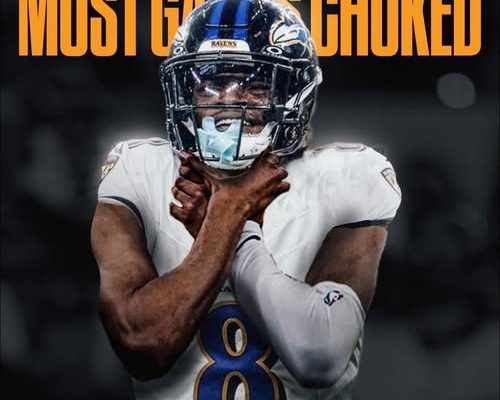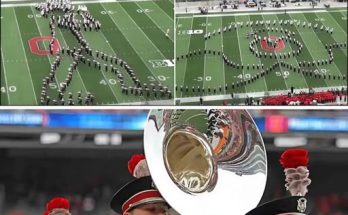Since 2021, the Baltimore Ravens have experienced a perplexing pattern that has frustrated fans, analysts, and casual observers alike. Despite consistently fielding talented rosters and showcasing dynamic playmakers, the Ravens have lost eight games in which they held a win probability of at least 90 percent, the most in the NFL over that span. Such statistics are not just surprising—they are extraordinary, highlighting a combination of misfortune, high-pressure failures, and the thin margins that define the NFL. Win probability, which is calculated based on factors such as score, time remaining, field position, and possession, is generally a reliable predictor of outcomes. When a team is given a 90 percent chance to win, the expectation is that they will almost certainly secure victory. Yet the Ravens have repeatedly fallen short, transforming what should have been routine wins into shocking defeats that leave long-lasting ripples throughout the season.
A close examination of these games reveals a mixture of causes behind these unexpected losses. Injuries, one of the most significant factors in football, have played a role in disrupting the Ravens’ rhythm at key moments. Quarterbacks and key offensive players have missed time, forcing backups to step in and often struggle under the weight of expectation. Similarly, defensive breakdowns in crucial situations, such as allowing late drives or failing to convert critical third downs, have contributed to these high-probability losses. The Ravens’ aggressive style, often relying on dynamic plays and unorthodox strategies, can sometimes backfire. While these tactics can produce spectacular wins, they also increase the risk of catastrophic failures when executed imperfectly, especially in close or high-pressure games.
The psychological dimension cannot be understated. Teams that repeatedly lose games they are expected to win can develop an intangible sense of pressure or anxiety in late-game situations. Fans and media narratives exacerbate this pressure, painting each subsequent high-probability situation as another potential failure. For the Ravens, this has meant that every game where they have a commanding statistical edge comes with heightened scrutiny and expectation. Players may feel the weight of history in these moments, consciously or subconsciously affecting decision-making on critical plays. This phenomenon is particularly pronounced in playoff or near-playoff games, where the stakes are magnified, and a single mistake can have season-defining consequences.
Adding to the narrative is the stark contrast between the Ravens’ past reputation and their recent struggles in these situations. Historically, Baltimore has been known for resilient, opportunistic football, leveraging the strategic mind of head coach John Harbaugh and the legendary presence of players like Lamar Jackson to control outcomes. Jackson’s dynamic skill set as a dual-threat quarterback has made him one of the most unique and difficult players to defend in modern football. Yet, even his brilliance has not been immune to the unpredictable nature of these high-probability losses. Games in which Jackson has orchestrated dominant performances still ended in heartbreak, showing that no level of individual excellence can completely insulate a team from the vagaries of sport.
The impact of these repeated near-misses has been tangible in both standings and perception. The Ravens’ failure to convert high win probability scenarios into victories has cost them playoff seeding, positioning, and, at times, the possibility of contending for the Super Bowl. Such outcomes influence how the team is viewed in betting markets, among media analysts, and within the league itself. A recent illustration of this is the shift in the Super Bowl odds market, where the Ravens have now been overtaken by the Buffalo Bills on platforms like Kalshi. Once considered one of the top teams with the highest chances of hoisting the Lombardi Trophy, Baltimore’s repeated struggles in these critical moments have tempered expectations and recalibrated market predictions.
The Bills’ rise relative to the Ravens underscores the importance of consistency and the ability to close out games. While the Ravens have the talent and scheme to dominate statistically, the Bills have demonstrated a capacity to secure victories in expected scenarios, maintaining composure under pressure and effectively managing the end-of-game moments. In the NFL, where playoff positioning and Super Bowl odds are finely tuned to outcomes over a few short weeks, the ability to consistently win when favored cannot be overstated. It reflects not only skill and preparation but also mental toughness, situational awareness, and adaptability under adversity.
For Baltimore, addressing this troubling trend will require a multifaceted approach. Coaches will need to examine decision-making in critical late-game situations, ensuring that play-calling maximizes the likelihood of converting statistical advantages into actual wins. Players may need to refine their focus and execution in high-pressure scenarios, treating each game as an isolated challenge rather than as part of a cumulative narrative of past failures. Injuries, always an unpredictable factor, must be mitigated through depth management and strategic rest, ensuring that key contributors are available in moments that matter most. While some losses are simply unlucky, a pattern of repeated collapses suggests that intervention—both tactical and psychological—is necessary to break the cycle.
Despite these challenges, the Ravens remain a formidable team with legitimate championship aspirations. The talent on the roster, combined with a well-respected coaching staff, means that Baltimore is rarely out of contention. However, fans and analysts now watch the team with a heightened awareness of their vulnerability in what should be “easy” situations. Each game with a 90 percent or higher win probability is no longer viewed as a foregone conclusion but rather as a potential moment of drama, anxiety, and unpredictability. This shift in perception adds a layer of intrigue to each contest and raises the stakes for the players and coaches alike.
Ultimately, the Ravens’ streak of losing eight high-probability games since 2021 serves as both a cautionary tale and a fascinating case study in the unpredictability of professional football. It illustrates how even the most talented teams can stumble in expected situations, emphasizing the importance of mental resilience, strategic adaptability, and flawless execution. As Baltimore moves forward, they must reconcile their storied past and high expectations with the realities of their recent performance. Each upcoming game offers a chance for redemption, an opportunity to reclaim their reputation as a team that converts statistical dominance into tangible victories. For fans, the hope remains that the Ravens can learn from past heartbreaks, reassert control over the unpredictability of the sport, and once again position themselves among the league’s elite. In a league defined by thin margins, this delicate balance between expectation and execution may ultimately determine whether the Ravens’ future is defined by near-misses or by triumphant success, potentially restoring them to the top of Super Bowl odds and to the hearts of their loyal supporters.



